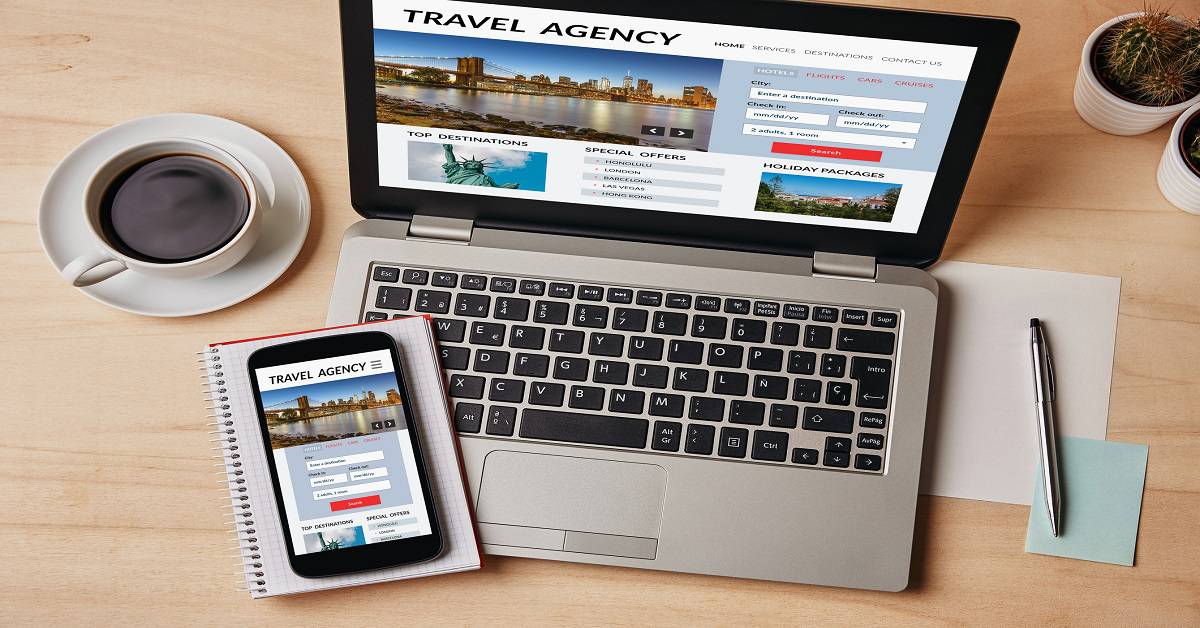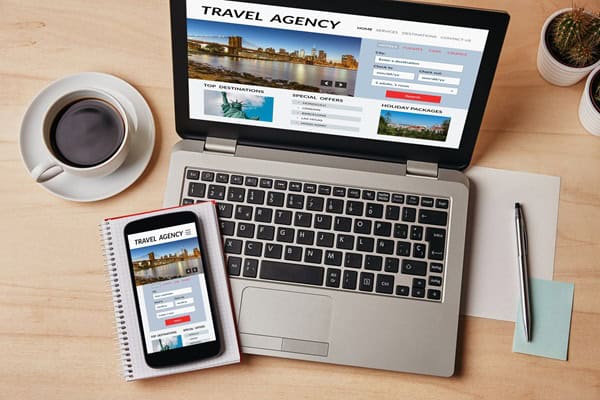A Comprehensive Guide for How to Start a Travel Agency

If you’ve ever wondered how to start a travel agency, you’re in the right place. In the swiftly changing travel agency industry entrepreneurs who are aiming to be successful must remain ahead of the competition and have a plan for every part of running their business, including a detailed travel agency business plan. This blog post will provide an in-depth guide to establishing your own independent travel agency.
From finding your niche in the competitive market, and registering your business as an LLC. Also understanding licensing requirements and training courses that build trust with customers. We have got you covered. We’ll also discuss effective communication channels for client support, and developing a comprehensive travel agency business plan. Also employing guerrilla marketing tactics, insurance requirements for travel agencies, and joining associations while staying current on global events.
By following the steps outlined here on how to start a travel agency you’ll be well-equipped with the knowledge needed. Knowledge to make informed decisions throughout this exciting journey to create an independent travel agency.
How to Start a Travel Agency by First Finding Your Niche
Conducting thorough research on the market and determining your ideal customer. Is crucial to finding your niche within the travel agency industry. By identifying popular trends, and emerging markets, and understanding the demographics, preferences, and needs of potential clients, you can tailor your services to a specific target audience. This will help you stand out from competitors while providing value-added experiences for travelers. The ongoing growth of the travel and tourism industry offers significant potential for new entrants to turn their passion for travel into a lucrative business.
Identifying Popular Trends and Emerging Markets
To stay ahead of the competition. It’s essential to keep an eye on popular trends and emerging markets in the travel industry. Research online resources like travel blogs or subscribe to trade publications such as Travel Trade Gazette (TTG). Attend conferences or webinars that discuss current developments in tourism.
Understanding Demographics, Preferences, and Needs of Potential Clients
Analyze data about traveler demographics using sources like Statista, which provides statistics on global tourism trends. Conduct surveys or interviews with potential customers to gain insights into their preferences when planning trips. Such as budget constraints or preferred destinations, and identify gaps where you can offer unique solutions tailored specifically for them.
- Action Step: Create a list of possible niches based on your findings from researching popular trends/emerging markets and analyzing traveler demographics/preferences.
- Action Step: Evaluate each niche idea by considering factors like profitability and competition level before selecting one that aligns best with your skills, interests, and resources.
Once you have identified the most popular trends and emerging markets in the travel agency industry. You can begin to understand what kind of services your potential clients may need. Registering your business as an LLC is a crucial step for any aspiring entrepreneur. It helps ensure that all finances are kept separate from personal ones and allows access to obtain an EIN number.
Registering Your Business as an LLC is an Important Step in How to Start a Travel Agency
When starting a travel agency. It is essential to register your business as a limited liability company (LLC) through the Small Business Administration (SBA). This step is crucial for protecting yourself legally while operating your new venture. Additionally, opening a separate business bank account is vital for effective financial management, as it helps keep business and personal finances distinct, safeguarding personal assets from business liabilities. Let’s dive into some key aspects of registering an LLC and obtaining the necessary identification numbers.
Importance of Separating Business Finances from Personal Ones
To avoid personal liability and ensure smooth financial management, it is vital to separate your business finances from personal ones. Opening a dedicated bank account for your travel agency will help you track expenses more efficiently and make tax filing easier. Additionally, consider applying for a business credit card to manage purchases related specifically to the company.
Obtaining Federal Employer Identification Number (EIN)
An EIN or Tax ID number is required when registering your LLC with the IRS. It serves as an identifier for tax purposes and allows you to hire employees if needed in the future. You can apply online through the IRS website, which usually takes only minutes.
In summary, properly registering your travel agency as an LLC helps protect you legally. While also streamlining financial operations within the organization. This sets up both short-term success and long-term growth potential.
Registering your business as an LLC is essential for protecting yourself and your finances. It’s time to take the next step in building trust with customers. By getting licensed and completing the necessary training courses.
Licensing Requirements and Training Courses
To ensure compliance with local regulations. Research the licensing requirements for travel agents in your area and take relevant training courses. To ensure you’re operating legally, research the specific regulations in your area. Done by visiting government websites or consulting local business resources. Additionally, consider enrolling in training courses designed for travel agents. Which will expand your knowledge of tourism trends and industry best practices. Starting with a host agency can provide financial benefits, available training, and resources that help aspiring travel agents succeed.
Building Trust with Customers through Professional Certifications
Certified Travel Associate (CTA): Offered by The Travel Institute, this certification demonstrates proficiency in various aspects of the travel industry. Discover the advantages of this program here.
Certified Travel Counselor (CTC): This advanced certification is also provided by The Travel Institute and focuses on management skills within the travel sector. Find out how to become a CTC at their official website: TheTravelInstitute.com.
American Society of Travel Advisors (ASTA) Verified Travel Advisor (VTA): ASTA’s VTA program covers legal issues, ethics, sales techniques, and marketing strategies among other topics relevant to running a successful agency. Get more information about becoming an ASTA VTA member from their website: ASTA.org.
Independent travel agents earning these certifications not only enhance their professional credibility but also helps you build trust. Trust with potential clients makes them more likely to choose your services for their travel needs. Becoming an independent travel agent offers flexibility, earning potential, and the freedom to manage your own business, making it an attractive career option.
Having the right credentials and instruction is essential for establishing customer confidence and delivering proficient service. Additionally, effective communication channels are essential for providing customer support and creating exceptional customer experiences.
Effective Communication Channels for Client Support
As a home based travel agency, it’s crucial to ensure that your communication channels are easily accessible. So clients can reach out whenever necessary. Creating an outstanding customer service experience is essential for establishing trust and devotion from your customers. Let’s explore some ways you can set up dedicated communication channels for client support.
Additionally, having a visually appealing and user-friendly website is vital for an online travel agency to showcase travel services and engage potential customers.
Setting Up Dedicated Phone Lines, Email Addresses, and Chat Support Systems
- Dedicated phone lines: Having a separate business line ensures professionalism while also allowing you to manage calls efficiently. Consider using services like Grasshopper or RingCentral, which offer virtual phone systems specifically designed for small businesses.
- Email addresses: Create a professional email address (e.g., info@yourtravelagency.com) using an email hosting provider such as Google Workspace.
- Chat support systems: Implement live chat functionality on your website through platforms like LiveChat. This allows clients to get instant answers from you or your team members during office hours.
Providing Exceptional Customer Service Experiences
How to start a travel agency and stand out in the competitive travel industry. It’s essential to provide top-notch customer service by being responsive and attentive to each client’s needs. Here are some tips for delivering outstanding client support:
- Maintain clear communication with clients throughout their trip-planning process. Answer questions promptly and keep them informed of any changes or updates.
- Go the extra mile to personalize your clients’ experiences, such as sending a thank-you note or offering tailored recommendations based on their preferences.
- Ask for feedback after each trip and use it to improve your services continually.
By continually striving to exceed customer expectations and solicit feedback. Your home-based travel agency will be well-positioned to provide a superior service experience. That will differentiate you from competitors and ensure repeat business.
Effective communication channels for client support are essential to providing exceptional customer service experiences. Developing a comprehensive business plan is the next step in how to start a travel agency and ensure your success.
To provide exceptional customer service as a home based travel agency, it’s important to set up dedicated communication channels such as phone lines, email addresses, and chat support systems. Maintaining clear communication with clients throughout their trip-planning process, personalizing their experiences, and asking for feedback can help create an outstanding customer service experience that sets you apart from competitors.
Develop a Comprehensive Business Plan for How to Start a Travel Agency
Successful travel agencies start with a comprehensive business plan is essential when starting any new venture. Consider using resources like LivePlan or Growthink’s Ultimate Template if drafting one from scratch seems too daunting initially. This travel agency business plan should outline all aspects of running a successful operation. Including funding sources, marketing expenses, and advertising campaigns. Also the number of employees needed to support your growing client base over time.
Additionally, establishing partnerships with cruise lines can significantly enhance the credibility and appeal of your travel agency, allowing you to offer exclusive perks and benefits to clients.
Funding Sources and Expenses
- Determine startup costs such as office equipment, website development, and licensing fees.
- Identify potential funding sources like personal savings, loans from family members or banks, and grants for small businesses in the travel industry.
- Create a budget that includes monthly operating expenses such as rent (if applicable), utility bills, employee salaries (if hiring staff), insurance premiums, and promotional activity costs.
How to Start a Travel Agency Using Marketing Strategies and Advertising Campaigns
- Analyze your target audience’s preferences to create effective marketing strategies that resonate with them. Social media platform usage habits can be insightful here.
- Select appropriate channels for promoting your travel agency, such as online ads on popular websites/apps targeting travelers, traditional print advertisements in newspapers/magazines, and radio/TV commercials, depending upon budget constraints and audience reachability factors.
Hiring Employees: Determining Staff Requirements
To ensure smooth operations at your home based travel business while catering to an expanding clientele base effectively:
- Evaluate current workload capacity vis-Ã -vis expected growth rate projections.
- Identify areas where additional manpower might be needed, such as customer support, sales and marketing, and finance management.
- Recruit skilled professionals who share your passion for travel and possess relevant industry experience.
Constructing an exhaustive business plan is imperative for any aspiring travel agency, as it will provide the bedrock for your enterprise and guarantee that you are ready to confront potential difficulties. With an effective marketing strategy in place, you can begin employing guerrilla tactics to promote your travel agency on social media platforms and leverage partnerships with local businesses for cross-promotion.
How to Start a Travel Agency by Employing Guerrilla Marketing Tactics
In addition to traditional advertising methods, consider employing guerrilla marketing tactics like Briana did when she started her backpacking trips company in Thailand eight years ago. Look into utilizing unorthodox strategies, such as Briana did when she opened her backpacking trips company in Thailand eight years ago, to extend your reach and create a stir around your business without depleting resources.
Creative Ways to Promote Your Travel Agency on Social Media Platforms
Utilize social media platforms such as Facebook, Instagram, and Twitter to showcase captivating images of popular destinations or share customer testimonials. Create engaging content that encourages users to interact with your brand by asking questions or hosting contests for free trips or discounts on services.
Utilizing Partnerships with Local Businesses for Cross-Promotion
Form strategic alliances with local businesses related to the travel agency industry – hotels, restaurants, tour operators – and collaborate on joint promotions. For example, offer exclusive deals for customers who book through both companies or create bundled packages that include accommodations and guided tours at discounted rates. These partnerships not only expand your reach but also provide additional value for clients seeking a seamless travel experience.
- Action Step: Identify potential partners within the tourism sector in targeted destinations; establish relationships based on mutual benefits and shared goals.
- Action Step: Develop creative promotional campaigns leveraging social media channels; track engagement metrics to measure success and adjust strategies accordingly.
By utilizing creative tactics for how to start a travel agency and leveraging partnerships with local businesses, agencies can effectively employ guerrilla marketing strategies to promote their services. Insurance requirements are an important factor when starting a travel business. Understanding the different types of insurance policies available is essential for successful business operations.
Insurance Requirements for Travel Agencies
Before launching your independent travel agency, it’s important to have the necessary insurance coverage in place to protect both you and your clients from potential risks associated with the services provided. In this section, we’ll discuss the different types of insurance policies available for travel businesses and how to compare quotes from various providers.
Understanding Different Types of Insurance Policies Available for Travel Agencies
- Professional Liability: This covers claims arising from professional negligence or errors that may result in financial loss for clients.
- Commercial Liability: This protects against claims related to bodily injury or property damage caused by business operations.
- Error & Omissions (E&O): E&O coverage safeguards against mistakes made while providing advice or booking services that could lead to client dissatisfaction and lawsuits.
- General Liability: This policy provides broad protection against legal liabilities resulting from accidents, injuries, or other incidents occurring on your premises or during business activities.
Comparing Quotes From Various Insurance Providers
To ensure you get the best value and appropriate coverage levels, it’s essential to compare quotes from multiple insurance providers. You can start by reaching out to local agents who specialize in small businesses like yours. Alternatively, consider using online platforms such as Insureon, which allows you to request customized quotes based on your specific needs quickly. When comparing offers, pay attention not only to premium costs but also deductibles, policy limits, exclusions, and customer reviews regarding claim handling experiences.
It is important to research the various insurance policies available to travel agencies and compare quotes from different providers in order to protect your business. Additionally, staying up-to-date on global events can help you monitor international affairs that may affect popular tourist locations.
Join Associations and Stay Current on Global Events
One of the best ways how to start a travel agency and grow your travel agency is by joining associations such as the Association of Independent Tour Operators (AITO). These organizations provide valuable networking opportunities while also offering access to resources that may prove helpful during the startup phase of operations, including office equipment, comfortable furniture, and conference room spaces for clients to meet and discuss their upcoming adventures.
Monitoring International Affairs and Weather Conditions Affecting Popular Tourist Locations
- International affairs: Staying current with global events impacting destinations around the world is crucial for any successful travel agency. By keeping tabs on news developments, you can better serve your customers while positioning yourself as an expert within your field. Some reliable sources include BBC World News, CNN International, or subscribing to a reputable news outlet’s newsletter.
- Weather conditions: It’s essential to monitor weather conditions in popular tourist locations since they can significantly impact travelers’ plans. Utilize websites like The Weather Channel, or apps such as AccuWeather (iOS/Android app available).
In summary, joining professional associations and staying up-to-date with international affairs will not only help you establish credibility but also contribute to growing a successful home-based travel agency business.
FAQs About How to Start a Travel Agency
What are the 8 easy steps to start a travel agency?
- Find your niche in the travel industry by identifying trends and demographics. Consider the role of online travel agencies and the competitive landscape they create, as new agencies must attract clients away from established platforms like Expedia.
- Register your business as an LLC and obtain an EIN.
- Fulfill licensing requirements and complete training courses for certifications.
- Set up effective communication channels for client support, such as phone lines and email addresses.
- Develop a comprehensive business plan outlining goals, strategies, and financial projections.
- Employ guerrilla marketing tactics on social media platforms to promote your agency.
- Obtain necessary insurance policies for your travel agency from reputable providers.
- Join associations related to the travel industry and stay current on global events affecting tourism.
How do I start a successful travel agency?
To start a successful travel agency, focus on finding a profitable niche market, providing exceptional customer service experiences, utilizing creative marketing strategies like partnerships with local businesses or social media campaigns, obtaining professional certifications to build trust with clients, staying informed about international affairs impacting popular tourist locations, and continuously adapting to changes within the industry.
Is it a good idea to start a travel agency?
Starting a travel agency can be rewarding, especially if you have a passion for traveling and helping others plan their trips. However, many ask will my travel agency make money. Success depends upon factors such as competition within chosen niche markets, the ability to adapt to changing consumer preferences, and technological advancements. It’s essential to conduct thorough research and create detailed business plans before embarking on this entrepreneurial journey.
How much does it cost to start being a travel agent?
The cost of starting a travel agency varies depending on factors like business structure, location, and marketing efforts. Generally, expect to spend between $1,000 to $10,000 for initial setup costs such as registration fees, training courses, certifications, insurance policies, office equipment, and promotional materials.
Conclusion
Creating a travel business can be an invigorating and remunerative endeavor, yet it necessitates thoughtful preparation and precise focus. From identifying your niche market to obtaining the necessary licenses and insurance policies, there are many important steps involved in how to start a travel agency successfully.
To begin, it’s important to develop a solid business plan that outlines your goals, target market, and financial projections. Consider whether you want to operate a home-based travel agency or establish a physical business location. Research successful travel agencies to learn from their strategies and identify areas where you can differentiate yourself.
The next step in how to start a travel agency is to obtain any necessary licenses and certifications required by your state or country. This may include a seller of travel license or a business license. It’s also important to obtain liability insurance to protect yourself and your clients.
Once you have the legal and financial aspects in order, it’s time to focus on building your brand and attracting clients. Develop a strong online presence through a website and social media channels. Consider partnering with other businesses in the travel industry, such as hotels or airlines, to offer package deals or discounts to your clients.
As you begin to attract clients, provide exceptional customer service experiences to build loyalty and positive word-of-mouth. Stay up-to-date with industry trends and events to offer the latest and greatest travel options to your clients.
Disclosure: Some of the links in this article may be affiliate links, which can provide compensation to us at no cost to you if you decide to purchase. This site is not intended to provide financial advice. You can read our affiliate disclosure in our privacy policy.





